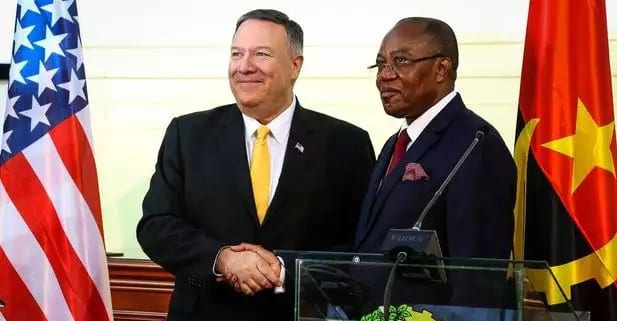Last updated on September 11th, 2021 at 03:03 pm
United States Secretary of State Mike Pompeo is visiting Senegal, Angola and Ethiopia on his maiden African trip. He is also the first U.S. Cabinet official to visit in more than 18 months.
He left Senegal Sunday to go to Angola and after that will travel to Ethiopia as the Trump administration tries to counter the growing interest of China, Russia and other global powers in Africa and its booming young population of more than 1.2 billion.
In Angola, an oil-rich country whose people remain impoverished, Pompeo will meet with President Joao Lourenco, who is making strides against corruption, including actions against close relatives of the former leader.
Then Pompeo heads to Ethiopia, Africa’s second-most populous nation with more than 100 million people and the headquarters of the African Union.
Ethiopia, a key U.S. security ally in the Horn of Africa, has undergone dramatic political reforms since Nobel Peace Prize-winning Prime Minister Abiy Ahmed took office in 2018. The loosening of repressive measures has been exploited by some with long-held grievances, leading to sometimes violent ethnic tensions that threaten a national election later this year.
Pompeo was expected to arrive late Monday in Ethiopia, Africa’s second most populous country and a key U.S. security ally in the Horn of Africa region. Its Nobel Peace Prize-winning Prime Minister Abiy Ahmed is under pressure to uphold his dramatic political reforms amid rising ethnic tensions ahead of a major election in August.
Abiy’s government is also under pressure from the U.S. to reach an agreement with Egypt on the massive Grand Ethiopian Renaissance Dam project that Ethiopia says is crucial to pull its people out of poverty. Egypt, however, worries that the dam will limit its access to the Nile River waters.
The countries, along with Sudan, are expected to come to a final agreement late this month in Washington.
Pompeo on Monday lauded Angolan President Joao Lourenco’s anti-corruption drive, which has seen him pursue his predecessor’s children over accusations they fleeced state coffers.
“During his first two-and-half years in office President Lourenco has done great work to make it (corruption) a ghost of the past,” Pompeo told a news conference during a one-day visit to Luanda where he held talks with Lourenco.
Last month, Angola indicted Isabel dos Santos, the 46-year-old billionaire daughter of ex-president Jose Eduardo dos Santos, for a host of top-level financial crimes, including money laundering and influence peddling.
“He has increased transparency, he has helped financial institutions clean up their books and he has pursued bad actors,” he said.
Pompeo said he was “encouraged” by Lourenco’s efforts to privatise 195 state-owned enterprises, describing it as “a move that will greatly attract private investment”.
He also said Lourenco had extended an invitation to President Donald Trump to visit the southern African country.
“I will make sure I convey that back directly to President Trump.
“I appreciate that you all would welcome a visit from President Trump, he would very much would like to get here as well. When that will happen, goodness knows, it’s busy year, it’s an election year,” he said.
In Senegal, Pompeo said the Trump administration is working to determine what level of American military forces is needed in West Africa to counter the rise of extremist violence in the region.
Speaking at the end of his visit to Senegal, Pompeo said he discussed the issue of the U.S. military presence in West Africa with President Macky Sall amid reports that the Trump administration intends to reduce troops in Africa.
“We did have a lot of conversation about security issues here, about America’s role in those. We’ve made it clear that the Department of Defense is looking at West Africa to make sure we have our force levels right,” Pompeo said to reporters Sunday. “I was here as CIA director, so I know these security issues very, very well. We’ll get it right, we’ll get it right collectively; I’m convinced of that.”
Pompeo said the U.S. will work with Senegal, other West African countries and France to counter the growing threat of extremist violence.
“We have an obligation to get security right here, in the region — it’s what will permit economic growth and we’re determined to do that,” Pompeo said. “And I’m convinced that when our review is done, we’ll have a conversation with not just Senegal, but all the countries in the region … We’ll deliver an outcome that works for all of us.”

